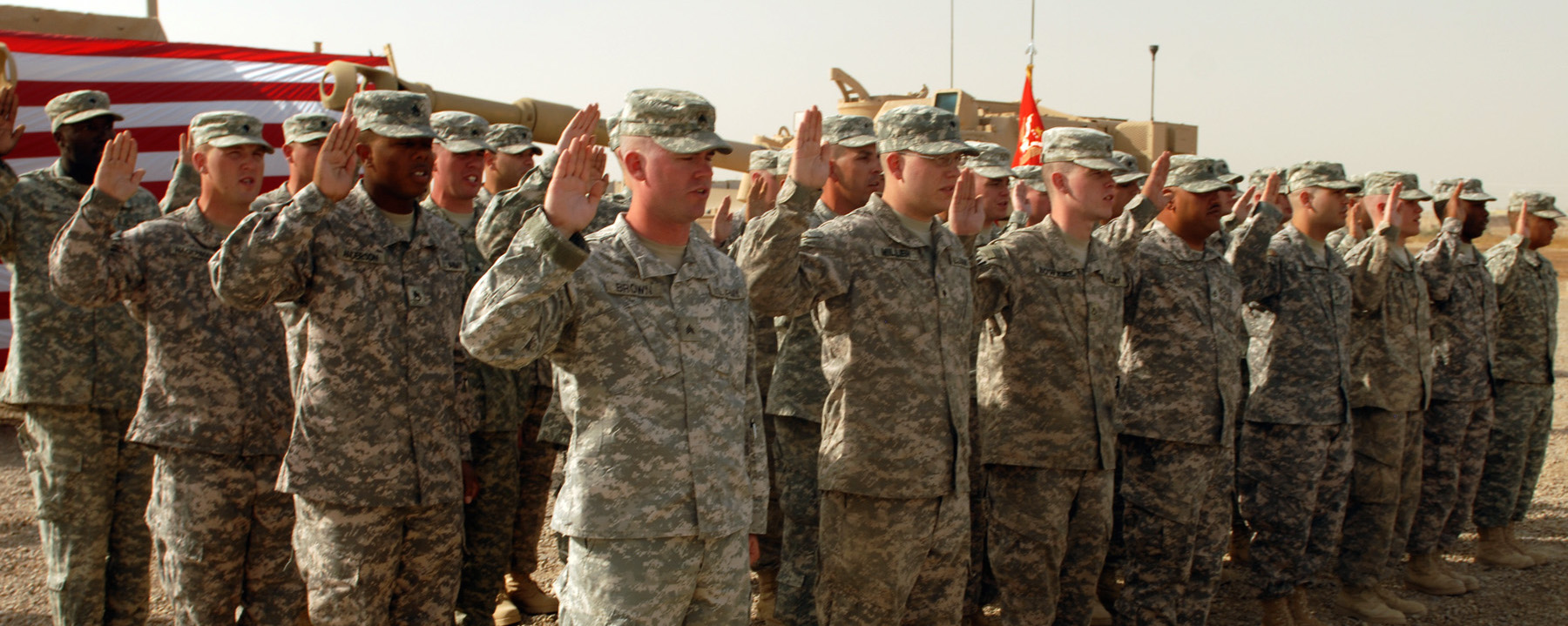Choosing the Path of Peace in Syria Part Three: The Perils of Another American Quagmire
This is Part Three of Peace Action’s multi-part series on U.S. Syria policy.
While many Americans are still reeling from an unexpected end to a treacherous election season, the civil war in Syria rages on, as does the need for a robust discussion on the U.S. approach to the conflict. Donald Trump’s proposals during the campaign — to deploy 20,000-30,000 troops to Iraq and Syria, kill terrorists’ families, and “bomb the shit out of em [ISIS],” to name a few — suggest that his administration will pursue major military escalations in Syria and elsewhere. But it’s not only his campaign statements that suggest this, it’s also the militaristic policy positions of conservative think tanks and Trump’s potential cabinet picks, which taken in conjunction with his statements strongly suggests that he intends to dramatically escalate the U.S. military role in Syria, which would have a devastating impact on the region as well as the national security interests of the United States.
Discouraging Indicators
While Trump is now “the decider,” as George W. Bush once put it, the perspectives of conservative foreign policy elites will have a significant impact on his foreign policy. Many of those elites work for formidable conservative think tanks such as the Heritage Foundation, which Politico has characterized as “one of the most influential forces shaping President-elect Donald Trump’s transition team,” the American Enterprise Institute (AEI), and Foreign Policy Initiative (FPI), to name a few, and these organizations by and large support deploying a significant number of troops to Iraq and Syria.
In February, a distinguished fellow at the Heritage Foundation wrote an article titled Reviving American Power After Obama, in which he argued that “its [ISIS’] total defeat is necessary, not only to protect the homeland from terrorist attacks but to reverse the trajectory toward more war and chaos in the Middle East. This goal can be achieved only by interjecting a substantial increase of U.S. combat forces into the fight against ISIS.” That same month, an AEI think piece seemed to advocate deploying tens of thousands of troops in the fight against ISIS, arguing that “everyone knows” U.S. troops are “necessary to win” and that it’s “worth repeating that it took 12,000 American troops to oust insurgents from Fallujah in 2004, and the capabilities and resources of those insurgents pale in comparison to those of the Islamic State.” A Foreign Policy Initiative article in August argued that because “Obama committed insufficient forces to the fight… the Islamic State is now a worldwide terrorist network that can direct or inspire attacks across the globe.” However, it concluded that “if his successor recognizes that the destruction of ISIS will require a concerted and continuous global effort over many years, he or she can lay the foundation for victory.” This consensus among the conservative foreign policy elite would be hard to ignore even if Trump wanted to, and there’s no indication that he does. In fact, Trump’s naming of Lt. Gen. Michael Flynn for National Security Advisor as well as his shortlists for Secretaries of State and Defense — the three positions most likely to impact his Syria policy — further indicate that he has every intention of pursuing this approach.
Incoming National Security Advisor Michael Flynn has called Islam a cancer, and tweeted that “fear of Muslims is rational.” In regards to confronting ISIS, Flynn has said that “we have to put troops on the ground,” and that “if we know that their headquarters exist in a place called Raqqa, Syria, we should eliminate, we should destroy Raqqa, Syria.” For the record, Raqqa is a major city and home to hundreds of thousands of civilians.
As of this writing, the shortlist for Secretary of State includes extreme hawks like former New York Mayor Rudy Giuliani, former U.S. Ambassador to the U.N. John Bolton, as well as run of the mill hawks like former Massachusetts Governor Mitt Romney and former C.I.A. director David Petraeus. Bolton, a Senior Fellow at AEI who called for bombing Iran during the height of the nuclear negotiations, wrote after the election that “destroying ISIS should certainly be a priority,” and that Trump should “quickly reverse Obama’s strategy” against ISIS. Giuliani, who recently made the false claim that “anything’s legal” during war, argued in a June interview with Fox News that “we have to commit, not just bombings, but we have to commit troops to wiping them [ISIS] out. We should have done it five years ago.” He went on to argue that there should be “no timetable” for this effort, stating, “here is the timetable, when they stop threatening us.” Mitt Romney wrote in an op-ed after the 2015 Paris Attacks that “we must wage the war to defeat the enemy [ISIS], not merely to harass it… Only America can lead this war, and that leadership means being willing to devote whatever resources are required to win — even boots on the ground.” Unlike the others, Petraeus has opposed a large U.S. ground force in Syria, instead advocating for increased military support for Syrian opposition forces and retaliatory strikes against Assad’s forces for attacks against civilians.
As for Trump’s Secretary of Defense shortlist, the list reportedly includes former National Security Advisor Stephen Hadley, former Senator Jon Kyl, Rep. Duncan Hunter (R-CA), Sen. Tom Cotton (R-AR), and former commander of U.S. Central Command James Mattis. In place of an exhaustive list of their hawkish credentials, suffice to say that their positions on Syria are similar to those of the potential picks for Secretary of State, which further suggests that the incoming administration is embracing an interventionist approach to foreign policy.
Another American Quagmire
Deploying 20,000-30,000 troops in Iraq and Syria would be a foreign policy blunder of epic proportions. If 15 years of waging a global war on terror has taught us anything, it’s that no amount of military force can address the grievances and economic conditions that lead people to join terrorist groups, in fact military force almost always exacerbates those grievances and economic conditions. In particular, the presence of large numbers of U.S. ground troops serves as one of the most effective recruitment tools terrorist groups could ask for, and they do. In a 2014 audio recording, an ISIS spokesperson addressed President Obama directly, asking, “Is this all you are capable of doing in this campaign of yours? Are America and all its allies… unable to come down to the ground?”
Numerous counterterrorism analysts agree that ISIS has been trying to bait the U.S. into a ground war for a variety of reasons, and most of those reasons are the same reasons why acquiescing would be a terrible mistake. For one, it would increase the number of symbolic targets terrorist groups could go after. Groups like ISIS and al Qaeda use each successful attack, particularly against Western military targets, as propaganda to bolster their recruitment efforts, and the more U.S. troops stationed in Iraq and Syria, the more opportunities there are for launching these attacks. More importantly, a large U.S. ground force would fit perfectly into the narrative that the U.S. is at war with Islam, and the physical presence of U.S. troops would serve as a constant visual reminder of that narrative to those susceptible to it.
In addition to the propaganda victory a major deployment would represent for terrorist groups, such a deployment risks sucking the U.S. into another quagmire in the Middle East. For starters, what happens if six months to a year after the deployment, little progress has been made in ousting ISIS from its strongholds? Would we send more troops? Even if 20,000 to 30,000 troops were able to drive ISIS out of major cities like Raqqa in Syria, which is not a given, ISIS would adapt and move underground while continuing to mount attacks and recruit new fighters, so at what point would the U.S. declare victory? And when it does, what happens next?
When we invaded Iraq in 2003, many rightly asked what the exit strategy was. There wasn’t one. While 20,000-30,000 troops is a significantly smaller force than the roughly 160,000 troops stationed in Iraq during the surge, it still begs the same questions: when do they leave, and what happens when they do? If Giuliani has his way, U.S. forces wouldn’t leave until “they [ISIS] stop threatening us,” which would be never, because as long as U.S. troops are stationed in Iraq and Syria, there will always be large numbers of people who see them as an occupying force and are willing to join extremist groups to stand up to them. A more realistic scenario involves an eventual withdrawal that would leave a similar power vacuum to the one left after U.S. forces withdrew from Iraq in 2011, a vacuum largely credited with creating the conditions necessary for the rise of ISIS in the first place. If you’re feeling a sense of déjà vu, you’re not alone.
While the risks involved with deploying a large U.S. ground force in Iraq are familiar enough, the risks associated with putting thousands of U.S. troops in Syria are even greater. In Syria’s civil war, hundreds of armed groups are grappling for power, and international players including the U.S., Russia, Iran, Turkey, Saudi Arabia, and others, most with proxies or their own troops on the ground, are all working to advance their divergent interests. Dropping a large U.S. ground force into the middle of this conflict, whether or not with the sole intention of going after ISIS, would further complicate the dynamics on the ground, and risk forcing the U.S. to take sides in the multidimensional power struggle.
For example, the U.S. has already tried to place itself between two partners in the region, Turkey and the Kurdish-led Syrian Democratic Forces. Turkey sees the expansion of a Kurdish autonomous zone in northern Syria as a threat to its national security, fearing that the establishment of a de facto Kurdish state on its border could embolden more Kurds within Turkey to join the decades-old separatist movement seeking the same autonomy. Turkish and Kurdish forces have already been fighting in northern Syria, and the U.S. has urged both to stop targeting each other and focus instead on defeating ISIS. A large number of U.S. troops on the ground in Syria however, presumably working with Syrian Kurds to advance on ISIS strongholds, could force the U.S. to actually take sides in that conflict rather than play the impartial partner to both.
As for other actors on the ground in Syria, the presence of U.S. troops risks escalating the conflict in the case of a mistaken attack on U.S. troops. Just as the U.S. reportedly struck a group of Syrian government forces by accident, killing dozens of Syrian troops, Russian or Syrian forces could accidentally strike U.S. forces in Syria, a risk that would significantly increase if a large U.S. ground force were present on the Syrian battlefield. Such an incident could greatly increase tensions between the U.S. and Russia, and in a worst case scenario, could lead to a direct military conflict with Russia.
Simply put, the potential for escalation inside Syria is much higher once a large U.S. ground force is added to the mix.
Changing Course on Assad, and Diplomacy
In an interview with the Wall Street Journal following the election, Trump reiterated that his focus in Syria would be on defeating ISIS, rather than on taking sides against Syrian President Bashar al-Assad:
My attitude was you’re fighting Syria, Syria is fighting ISIS, and you have to get rid of ISIS. Russia is now totally aligned with Syria, and now you have Iran, which is becoming powerful, because of us, is aligned with Syria… Now we’re backing rebels against Syria, and we have no idea who these people are.
If Trump refuses to pursue the type of military confrontations with Assad that Hillary Clinton and some of her foreign policy advisors advocated during the campaign, that would be a welcome development, although given the widely held position among both Democratic and Republican foreign policy elites that the U.S. should stand up to Assad militarily in one way or another, pretending confrontation with Assad is off the table would be a mistake. But even if Trump doesn’t go after Assad, taking the opposite extreme could come with its own consequences. Staffan de Mistura, the U.N. envoy to Syria, recently pointed out in an interview with the Guardian that allowing Russia and Assad to secure a complete military victory in Syria without a political process that grants some degree of autonomy to the Sunni population of Syria would fuel sectarian divides and further radicalize Sunnis in the region against the Syrian government as well as Western nations. Mr. de Mistura painted a disturbing picture of this all too possible future:
Solely concentrating [on] a military victory will [lead to] a pyrrhic victory followed by a long-term, low intensity, but extremely painful guerrilla war, in which Syrians continue to die… You will create a space in which, within three months, there will be more people joining Islamic State. You will not win them over unless there is a political solution.
Time will tell if the incoming administration will continue to pursue a diplomatic solution to the Syrian civil war, but if conservative thinking on the merits of diplomacy with Iran or North Korea is any indication, the U.S. may walk away from the negotiating table, which would dramatically reduce the prospects for a diplomatic solution. As the Guardian put it, “De Mistura’s warnings will be seen as gentle diplomatic advice to the incoming Republican administration of Donald Trump that a policy towards Syria focused solely on the military destruction of ISIS, likely in a de facto alliance with Russia and Assad, the Syrian president – as Trump has suggested – would fail to secure a lasting settlement.” And as de Mistura pointed out, without a political solution, there is no path, for the foreseeable future at least, to sustainable peace in Syria.
Part Four of this series will discuss the pitfalls of launching strikes against Syrian government targets and arming Syrian opposition forces.
Click here to read Part One of this series: The Siren Song of the No-Fly Zone
Click here to read Part Two of this series: “Safe Zones” Aren’t Safe
-
[…] Comment to Peace Action’s article by Jon Rainwater “Choosing the Path of Peace in Syria Part Three: The Perils of Another American Quagmire” https://peaceblog.wordpress.com/2016/11/23/choosing-the-path-of-peace-in-syria-part-three-the-perils… […]
Leave a Comment







Excellent views: US should NOT interfere in Middle East especially against Damas & Russia !
OK ! US must cooperate with Russia and let Damas decide for its country : Bashar Alassad may be a better syrian than these so-called
” insurgees” !
Assad not allowing Syrians to decide is why the regime is a “dictatorship”. The Iranians, Iraqis, Afghanis and Russian far out number any Syrians still fighting for Assad. Nationalism is a reason to get Assad out, not keep his clique in power.
Article describes the US right wing obsession about ISIS, and the folly of sending US troops into Syria and Iraq to fight them. Seems fair comment to me. The author welcomes not supporting the armed Syrian Opposition (formed of many mostly cooperating groups!). Seems very wrong to me. Then he states Assad’s complete military victory will lead to Sunni radicalization. Obviously this is not an option either. So the author finishes with the statement “without a political solution, there is no path, for the foreseeable future at least, to sustainable peace in Syria”. It is obvious that a political solution is needed, but there is no way to convince Assad that he needs to take part in a meaningful political process. The Syrian Opposition have been saying for a long time now that it is very obvious that only the threat of a military defeat and meaningful consequences for war crimes, will lead the Assad clique to the negotiating table to engage with working on a political solution. I must conclude that so far no path to peace has been described by these articles. Seems like a lot of feel good “progressive” talk, but no real solution. Tell this to the activists now waiting in Eastern Aleppo. Waiting now for death by bomb, bullet or if unlucky by torture and starvation. They must be glad you care. Perhaps you or they can convert their executioners to pacifism, any ideas on a speed course? The 4th part will smear the opposition and heap doubt on supporting them. Syria then will have been dealt with, by 4 well researched articles no less and we can all breathe a sigh of relief.